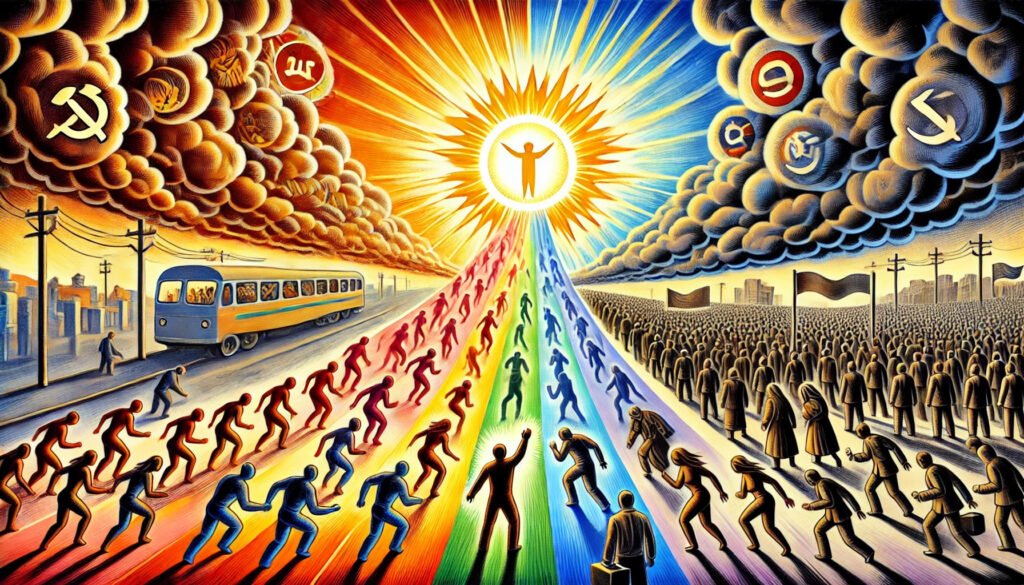这是一篇经济学方面的短文,仅仅从极小的方面介绍哈耶克的经济和哲学思想,如欲详细了解请全面阅读其著作,文中图片无关任何组织和个人,请勿对号入座。
弗里德里希·哈耶克(Friedrich Hayek)作为20世纪最重要的经济学家和政治哲学家之一,以其对自由主义和市场经济的坚定支持而闻名。在他的著作《通往奴役之路》中,哈耶克详细批判了少数服从多数、集体主义和共产主义等社会主义观点。本文将结合圣经原则,探讨如何应对这些观点,进一步培养批判性思维。
哈耶克的批判
少数服从多数的观点主要源自民主制度中的多数规则原则,最早在雅典民主中得以体现,并在法国大革命后广泛传播。该原则的目的是确保决策的民主性和代表性,避免权力集中在少数人手中,以实现更广泛的公众参与。哈耶克认为,少数服从多数的原则在理论上看似民主,但实际上却隐藏着巨大的危险。多数决策往往忽视了个体的权利和自由,可能导致暴政,因为多数人可以通过民主程序合法地剥夺少数人的基本权利和自由。
集体主义的思想起源于19世纪的社会主义运动,代表人物包括卡尔·马克思和弗里德里希·恩格斯。集体主义在俄国革命后成为苏联和其他社会主义国家的核心理念。其目的是通过集体所有制和计划经济,消除资本主义的剥削,实现社会的公平与正义。他对集体主义的批判集中在集体主义对个人自由的压制上。集体主义强调社会整体利益高于个体利益,要求个体服从集体决策。他认为,这种做法实际上剥夺了个人的自主权和创造力,导致经济计划和决策的集中化缺乏灵活性和适应性,人们内心对自由的追求仍然会四处寻找突破口。

共产主义作为一种理论由卡尔·马克思和弗里德里希·恩格斯在《共产党宣言》中系统提出,后在苏联、中国等国家实践。其最终目标是实现无阶级社会,通过消灭私有制和市场经济,实现物质的充分供应和社会的绝对平等。哈耶克对共产主义的批判尤为严厉。他认为,共产主义是一种乌托邦幻想,试图通过废除私有制和市场机制来实现平等和公正,但在实践中必然导致极权主义和经济崩溃。中央计划经济在社会起步阶段且人们懵懂不知所措时的确有一定的作用,但长期的应用则无法有效利用社会的知识和资源,导致资源浪费和生产效率低下。对个人自由造成压制,会导致人们在重压下的思维畸形,历史已多次证明了这一点。

基于圣经原则的批判性思维
圣经教导我们要尊重个体的价值和尊严。《创世记》1:27指出,“神就照着自己的形象造人,乃是照着他的形象造男造女。”这意味着每个人都是按神的形象创造的,具有不可侵犯的尊严和价值。基督徒应当捍卫个体的自由和权利,不应让任何多数团体凌驾于个人之上。通过祷告和智慧的指导,我们可以在决策过程中寻求神的旨意,确保公正和仁爱的原则得到遵守。
并且,个人利益与集体利益也应有效平衡。《罗马书》12:4-5指出,“正如我们一个身体上有好些肢体,肢体也不都是一样的用处;我们这许多人,在基督里成为一身,互相联络作肢体,也是如此。”这表明在基督的身体里,每个人都有独特的价值和作用,不能忽视个人的贡献。在实践中,我们应当尊重个人的创造力和自主权,同时在爱和谦卑中追求集体的和谐与合作。
圣经提倡公正与仁爱,但并不支持强制的平等。《哥林多前书》3:8说:“栽种的和浇灌的都是一样,但将来各人要照自己的工夫得自己的赏赐。”这表明每个人根据自己的努力和贡献得到回报是合乎公正的。基督徒应当通过自愿的爱心行动来帮助有需要的人,而不是依赖强制的经济制度。我们应当培养勤奋、智慧和爱心,在市场经济中实践公正和仁爱的原则。
哈耶克之所以提到了对上述集体主义、共产主义等的批判,究其原因是说出了思考问题的一个基本原则,那就是所谓的‘批判性思维’模式。培养批判性思维对于识别和抵制不合理的社会和经济制度至关重要。圣经也鼓励我们要有智慧和辨别力。《箴言》4:7说:“智慧为首,所以要得智慧,在你一切所得之内必得聪明。”通过不断学习和思考,从日常生活和工作中的一件件小事的处理中学会有理有据的思维模式,逐渐培养我们的批判性思维去解决问题的习惯,进而一步步实现辨别真理与谬误。
具体说的话我觉得应该广泛阅读圣经和其他经典著作,包括一些哲学方面的书籍等等,这是理解不同观点的基础;养成独立思考的习惯,不盲从权威或多数意见,勇于提出质疑和思考,当然,在体制内工作时或许要要适当‘掩饰’一下。有机会的话可以寻找适当的好友讨论与交流,通过讨论和辩论,听取不同观点,拓宽视野。但最重要的还是在祷告和默想中寻求神的智慧和指导,反思自己的立场和观点,这不仅仅可以养成自己思考问题的积极模式,更重要的是可以为孩子周围的朋友树立良好的榜样。
通过结合哈耶克的批判和圣经的原则,我们可以更加全面地理解自由、个人权利和社会公正的重要性,并在实践中捍卫这些价值。培养批判性思维,尊重个体的自由和创造力,是建设健康、和谐社会的关键。

(如有建议敬请留言讨论,邮箱:[email protected])
On Hayek’s Critique of Majority Rule, Collectivism, and Related Ideas
This is a short piece on economics that briefly introduces some key aspects of Friedrich Hayek’s economic and philosophical ideas. For a fuller understanding, one is encouraged to read his complete works. Note that the image accompanying the original text is not associated with any organization or individual, so please do not attribute it to anyone in particular.
Friedrich Hayek, one of the most important economists and political philosophers of the 20th century, is renowned for his staunch defense of liberalism and market economies. In his work The Road to Serfdom, Hayek offers a detailed critique of concepts such as minority compliance with majority rule, collectivism, and communist ideologies.
Hayek’s Critique
Majority Rule and Its Perils: The idea of minority compliance with majority rule originates from democratic systems—first seen in the ancient Athenian democracy and later widely disseminated following the French Revolution. This principle is designed to ensure that decisions are democratic and representative, preventing power from concentrating in the hands of a few and encouraging broad public participation. Hayek argued, however, that while the principle of majority rule may seem democratic in theory, it conceals significant dangers. Decisions based solely on the will of the majority often disregard individual rights and freedoms, potentially leading to tyranny. In a democracy, the majority can legally strip minorities of their fundamental rights and freedoms.
Collectivism: Collectivist thought originated in the 19th-century socialist movement, represented by figures such as Karl Marx and Friedrich Engels. After the Russian Revolution, collectivism became a core ideology in the Soviet Union and other socialist states. Its goal was to eliminate capitalist exploitation through collective ownership and planned economies, thereby achieving equality and social justice. Hayek’s criticism of collectivism focused on its suppression of individual freedom. Collectivism places the interests of the whole society above those of the individual and demands that individuals obey collective decisions. According to Hayek, this practice effectively strips individuals of their autonomy and creativity. It also leads to centralized economic planning that lacks the flexibility and responsiveness of market mechanisms. Ultimately, the human desire for freedom will always seek a way out of such rigidity.

Communism: Communism, as systematically articulated by Marx and Engels in The Communist Manifesto, was later implemented in nations like the Soviet Union and China. Its ultimate aim is to create a classless society by abolishing private property and market economies, thereby ensuring abundant material provision and absolute equality. Hayek’s critique of communism was particularly severe. He saw it as a utopian fantasy that sought to eliminate inequality and injustice by doing away with private property and the market—but in practice, such efforts invariably lead to totalitarianism and economic collapse. While centrally planned economies may serve a temporary function when a society is still in its early stages and its members lack knowledge, their long-term application cannot effectively harness the distributed knowledge and resources of society. Instead, such systems tend to waste resources and significantly reduce production efficiency, crushing individual freedom and distorting human thought under oppressive pressure—a fact history has repeatedly confirmed.

A Bible-Inspired Critique
The Bible teaches that every individual possesses inherent value and dignity. In Genesis 1:27, it states:
“So God created mankind in his own image, in the image of God he created them; male and female he created them.” This means that every person is created in God’s image and thus has an inalienable worth. Christians are therefore called to defend individual freedom and rights, ensuring that no majority group tramples on personal liberties. Through prayer and wise guidance, we can seek God’s will in decision-making processes, ensuring that justice and compassion prevail.
Furthermore, the Bible promotes a balance between individual and collective interests. In Romans 12:4–5, it is noted,
“For just as each of us has one body with many members, and these members do not all have the same function, so in Christ we, though many, form one body, and each member belongs to all the others.” This teaches that while every person has unique value and contributions, we must also nurture communal harmony and cooperation through love and humility.
The Scriptures advocate justice and compassion—but they do not endorse enforced equality. For instance, 1 Corinthians 3:8 declares,
“The one who plants and the one who waters have one purpose, and they will each be rewarded according to their own labor.” This suggests that it is fair for people to receive according to their efforts. Christians should extend voluntary, loving assistance to those in need rather than relying on coercive economic systems. We are to cultivate diligence, wisdom, and love, practicing justice and compassion even within market economies.
Hayek’s critiques of collectivism and communism ultimately derive from a fundamental principle of critical thinking—a mindset that is essential to recognize and resist irrational social and economic systems. The Bible encourages wisdom and discernment. Proverbs 4:7 advises:
“The beginning of wisdom is this: Get wisdom. Though it cost all you have, get understanding.” By diligently learning from daily experiences, we can develop a sound, rational approach to problem- solving, enabling us to distinguish truth from error.
In practical terms, this means extensively reading the Bible as well as classical works in philosophy and other disciplines. It also means cultivating independent thought—questioning authority and the popular opinion when necessary, even if one must sometimes “mask” one’s dissent in official settings. When possible, engage in thoughtful discussions with like-minded friends to broaden your perspective. Most importantly, seek God’s wisdom and guidance in prayer and meditation, reflecting on your own views, which not only fosters a proactive attitude toward thinking but also sets a positive example for those around you.
By combining Hayek’s insights with biblical principles, we can gain a fuller appreciation of the importance of freedom, individual rights, and social justice. Cultivating critical thinking and respecting personal autonomy and creativity are key to building a healthy, harmonious society.

(As an aside: If any organization or ideology loses its grounding among people—if it stands aloof like transient clouds that momentarily obscure the sun—it will never truly hinder the steady advance of those seeking the light.)

发表回复